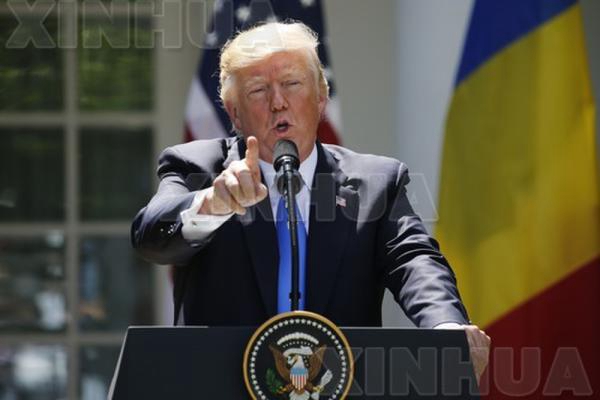What can be expected from Trump's tour of Asia?
- By Tim Collard
 0 Comment(s)
0 Comment(s) Print
Print E-mail China.org.cn, November 3, 2017
E-mail China.org.cn, November 3, 2017
 |
U.S. President Donald Trump [Xinhua] |
It will not be long before President Trump is in a position to experience the newly confident China in the wake of President Xi's course-setting speech to the 19th National Party Congress.
This trip was planned well before the Congress, and was intended to focus largely on the de-escalation of the impending nuclear crisis involving the DPRK. It is clear that the aversion of conflict is a key common interest of the two great powers, and that some degree of consensus on the way forward will be essential to this end.
Given the recent rancorous exchanges between Trump and DPRK leader Kim Jong-un, it would seem likely that the former will try to instil a greater sense of urgency into negotiations. But China is aware that precipitate actions carry with them the increased risk of a misstep, and so will probably wish to exercise a calming influence.
But, for a number of reasons, the scope of the visit has extended far further than peace on the Korean peninsula. There is still some doubt and anxiety over where Trump's decision to withdraw from a general Pacific trade agreement – the TPP – leaves the U.S.'s trading partners in the Asia-Pacific region, and Trump has some reassuring to do.
He was approached by a number of Asian leaders at the UN General Assembly in September to urge him to use the opportunity of his Asia visit to provide some reassurance. Trump will, accordingly, be present at the APEC forum in Vietnam, and also – after some hesitation – at the ASEAN meeting in Manila.
Trump had earlier been reluctant to attend, following some clashes with President Duterte – like Trump himself, a somewhat undiplomatic character – but ASEAN leaders convinced him that his absence would be most unhelpful to the region's interests. (Duterte, sensibly, has welcomed Trump's attendance in Manila, saying that the U.S./Philippine relationship is resilient enough to withstand a few differences of opinion.)
The other proposed destinations – Japan and the ROK – are already well-established U.S. allies, and so it is hardly surprising that the U.S. President should want to discuss the Korean nuclear issue with them, though neither is likely to be in a position to exert much influence; they will simply want to know what the Americans plan to do, and give their input before Trump goes to China.
Nonetheless, the fact that Trump is combining his visit to China with a tour of regional allies has caused alarm bells to ring in China. The Chinese ambassador in Washington, Cui Tiankai, has already issued an open warning to the U.S. not to try to operate a containment policy against China.
The Trump team has been working on an "Indo-Pacific" strategy since last spring, which China fears may be an attempt to forge an anti-Chinese "encirclement" based around India and Japan. But Cui said: "I don't think it will be in the interest of any countries if their aim is to contain China." No-one seriously believes that this would be possible; all the same, China has found it necessary to fire a shot across the bows of the U.S. hawks.
However, Ambassador Cui's message was not entirely negative. He recognized that American policy in East Asia does not necessarily need to be directed against China; as he said, this is not a zero-sum game. China recognized that the USA has legitimate interest in the Pacific region. And, on the perennial problem of the trade deficit, the Ambassador recognized that it was in the interest of both countries to reduce it gradually. And he also expected that the U.S. and China would be able to make "significant progress" on the Korean nuclear issue during Trump's visit to China.
Trump faces two major problems, and China could be of help to him in resolving both of them; the first, of course, is halting the drift towards open conflict with the DPRK, and the second is his need to talk tough to his electorate at home without disruption to relations with essential partners like China. So he feels the need to bring home tangible results, both on the security front and on trade. He cannot expect to extract concessions which would leave China at a disadvantage; so both sides must aim for a win-win outcome.
Trump has damaged his position in Asia by a lack of clarity on trade issues and by some provocative posturing on security issues. It can only be hoped that this Asian tour gives him an opportunity to provide clarity on U.S. intentions to the countries of the region, whether U.S. allies or not. And, most important of all, it will give him the opportunity for deeper engagement with a China which is positioning itself as a focus of stability and good sense within the Asia-Pacific region.
Tim Collard is a columnist with China.org.cn. For more information please visit:
http://www.ccgp-fushun.com/opinion/timcollard.htm
Opinion articles reflect the views of their authors, not necessarily those of China.org.cn.





